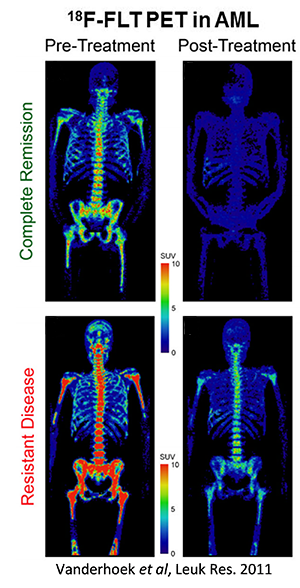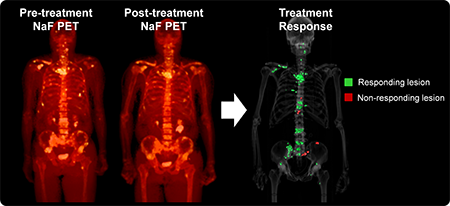The molecular imaging research program at the University of Wisconsin (UW) is composed of a multi-disciplinary team including researchers, physicians, radiopharmaceutical production staff, technologists, supporting staff, and graduate students. The primary focus of the program is to develop new molecular imaging agents, translate new molecular imaging agents into the clinic, and discover new applications of existing molecular imaging agents. UW houses world-class infrastructure fostering research along the entire chain of molecular imaging – from radioisotope production to image analysis. Equipment available to researchers includes a cyclotron, a GMP radiopharmaceutical production facility, clinical and pre-clinical PET/CT scanners, a PET/MR scanner, and computing resources.
 UW is actively developing and testing new molecular imaging agents for clinical use in diagnosis and treatment response assessment. Radiopharmaceuticals being tested for clinical applications include: 18F-DCFPyL, a prostate-specific membrane antigen PET agent that has been shown to be highly effective in prostate cancer detection; 18F-FLT, a marker of proliferation that has promising applications in treatment response assessment for various cancers and therapies; and 124I-CLR1404, a phospholipid ether analogue developed at UW by Dr. Jamey Weichert’s contrast agent lab that has demonstrated selective uptake in a variety of tumor models.
UW is actively developing and testing new molecular imaging agents for clinical use in diagnosis and treatment response assessment. Radiopharmaceuticals being tested for clinical applications include: 18F-DCFPyL, a prostate-specific membrane antigen PET agent that has been shown to be highly effective in prostate cancer detection; 18F-FLT, a marker of proliferation that has promising applications in treatment response assessment for various cancers and therapies; and 124I-CLR1404, a phospholipid ether analogue developed at UW by Dr. Jamey Weichert’s contrast agent lab that has demonstrated selective uptake in a variety of tumor models.
Molecular imaging agents being developed and tested in a pre-clinical environment include a wide variety of labeled peptides, proteins, antibodies, and antibody fragments for PET, optical, and photoacoustic imaging, as well as multimodal molecular imaging agents that can provide complementary and/or synergistic information via combinations of these imaging techniques. In addition, UW is expanding the critical roles that molecular imaging can play in image-guided drug delivery to cancer and various other diseases with biocompatible/biodegradable nanomaterials (e.g., silica-based, polymer-based, among others).
For clinically-available molecular imaging agents, UW is discovering new methods and applications in quantitative PET imaging. Research interests include quantitative imaging biomarkers of treatment response, automated analysis of 18F-NaF PET/CT imaging, applications of machine learning to PET/CT image analysis, quantitative harmonization of PET scanners, PET/MR imaging, and PET tumor segmentation algorithms, among others.
UW’s molecular imaging research program is enriched by its many collaborative relationships with other departments and institutions. Notably, collaborations between UW and General Electric Healthcare have led to multiple joint molecular imaging research projects. Additionally, through the Wisconsin Oncology Network for Imaging Excellence (WONIX) initiative, UW collaborates with various institutions throughout Wisconsin, providing access to advanced molecular imaging agents, clinical trials, and centralized image analysis.
